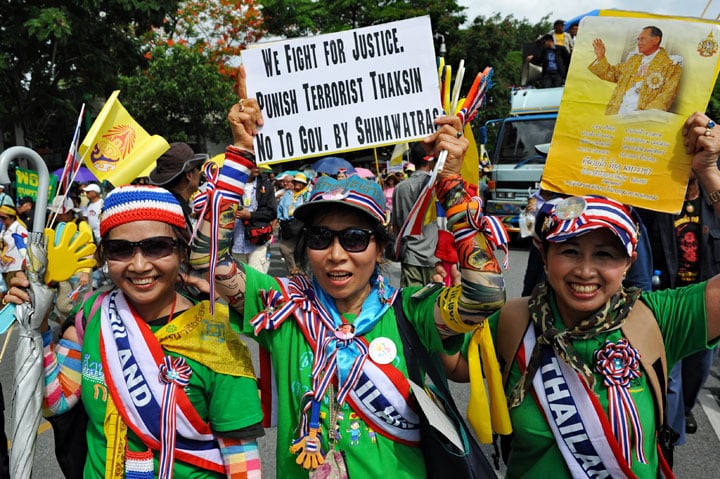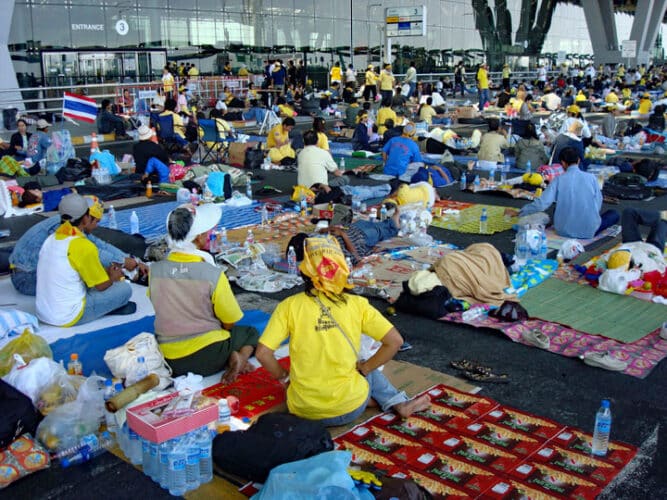The Salim in Thai politics, an exposition

(1000 Words / Shutterstock.com)
Thitinan Phongsudhirak wrote an op-ed in the Bangkok Post addressing the group of people called 'Salim'. It says a lot about the political events in Thailand in the past 15 years and the ideology that underlies them.
The Salim in Thai politics, an exposition
Few phenomena explain and support Thai politics more than the rise and fall of what is now somewhat disparagingly known as the Salim. That is a group of people who are compared to salim, a Thai dessert consisting of multi-colored thin noodles served in coconut milk with crushed ice. Once socially appealing and politically fashionable, Salim are out of fashion, brushed aside in a new era of anti-establishment protest for pro-democracy reforms under the new administration. What happens to this pro-military royalist and nationalist Salim will say a lot about Thailand's political future.
The Salim first came to the fore in 2010 when the yellow shirts were reinvented. They had originally protested in the streets of Bangkok from August 2005, paving the way for the military coup against the Thaksin Shinawatra government in September 2006. Yellow was the color identified with King Bhumibol Adulyadej the Great who reigned from 1946-2016. It was believed that donning yellow would reflect the virtues and deeds of the immensely popular monarch on them as well and bring them honor. Implicit in the yellow movement was the late king's moral authority, which came not from the votes of citizens in a democracy, but from loyal subjects in the Thai kingdom.
The Salim's political narrative was therefore inspired by and revolved around this regal moral authority and sense of superior ethics, leading to a holier-than-thou attitude and attitude. Translated into politics, the Salim necessarily looked down on the role of elected representatives and political parties. To them, politicians are nothing but opportunistic and corrupt, characterized by their constant bickering and vested interests. As a result, elections cannot be trusted and only endured when really necessary.
Not believing in popular will and the idea of a majority government, the Salim never won an election where they never bothered to win massive electoral support, especially in the densely populated North and Northeast regions. Their main vehicle, the Democratic Party, has lost every round of voting to Thaksin's parties since 2001. After the loss, the Salim felt it appropriate to reverse the election results by any means necessary.
It all started legitimately enough under the banner of the People's Alliance for Democracy (PAD) in August 2005 when Thaksin and his party members increasingly usurped parliamentary control and lined their pockets with government policies that favored their private companies. The yellow shirts saw themselves as virtuous and just, the so-called khon dee or good people. They were in conflict with 'evil' elected elites who made and kept promises to rural voters in what was denounced as 'populism', such as cheap universal health care schemes and rural microcredit.

Yellow Shirts block Suvarnabhumi airport (All themes / Shutterstock.com)
When the September 2006 coup and a new constitution still failed to stop Thaksin's powerful electoral machine in the December 2007 elections, the Yellow Shirts returned to the streets in mid-2008. This time they went on a rampage and occupied the government building (where they planted rice) and later Suvarnabhumi airport (where they played badminton). The portrait of the late king was often used as the symbol of the yellow shirts, with the reigning queen attending the funeral of a yellow-clad demonstrator at the time. Although they achieved their goals after the dissolution by the Constitutional Court of yet another ruling party of the Thaksin group in December 2008, the yellows became so dirty and ugly and at such a high cost to Thailand's economy and politics that they lost credibility .
The yellow then began to attract other colors besides red, which in 2009-10 was restricted to the disenfranchised pro-Thaksin street protesters who were compared to “stupid buffaloes”. At some point more colors entered the fray, all against the red color. The old yellow colors became the new Salim. One and the same, they made up the royalist and conservative minority in Thailand's vast electorate.
The Salim have a deep contempt and distaste for elected politicians who are said to be corrupt, but they get along reasonably well with army generals who do the same. Salims are necessarily in favor of the two coups in 2006 and 2014 because taking power was the only way to win outside the constitution as they continued to lose at the polling booth. Preferring appointees to elected representatives, the Salim have asked for a royally appointed government at key times over the past two decades.
Of course, as courts they have no qualms about banning opposition parties elected by voters. The latest was the Future Forward Party (FFP) in February last year. As they once denounced Thaksin, the Salim are now doing the same to Thanathorn Juangroongruangkit, the former leader of the disbanded FFP. Similar to how they rejected the Reds, the Salim now claim that the fledgling student-led protest movement has no knowledge of "Thai history" and is "brainwashed" by social media. Ironically, the Salim do not call the dissenters younger generations “stupid” because many of them are their own children.
While the Salim are generally well-educated, urban and cosmopolitan, they may also come from the lower rungs of the socio-economic ladder. The crucial dividing line is their perceived source of legality and political power. For the Salim, moral authority in a kingdom is above elected office in a democracy. The minority does not have monopoly rights under majority rule; the minority has the right to rule.
In 2013-14, the Salim had to take to the streets again to lay the groundwork for the overthrow of yet another Thaksin-controlled elected government, this time led by his sister Yingluck Shinawatra. As with the PAD yellows in 2008, the Salim under the People's Democratic Reform Committee (PDRC) swept through the Pheu Thai-led government, rejected the dissolution of parliament, prevented voting in some constituencies and spurred the army to intervene. In May 2014, the Salim lost allure and appeal, but gained power and government jobs.
The hopeless rule of the junta has since further eroded the status of the Salim. Now few seem to want to be known as Salim. Even Sondhi Limthongkul, the forerunner of the PAD and yellow pioneer in 2005, has maintained that he is not Salim, attributing it to the PDRC. There was a time during the last phase of the previous reign when the Salim could do no wrong and won every time they took to the streets. This is no longer the case.
While claiming to the contrary, the Salim do not subscribe to the ideal of equality. They must be morally superior in order to rule over the inferior rest. It is inconceivable to them that rural people and street sweepers in Bangkok and countless others less privileged without university degrees or financial means should be counted on an electoral equal with them.
But Thailand's tide is turning. Without the source of moral authority of the previous government, the Salim are now treading loose and shaky ground. Their heyday is over. The extent to which the Salim resist the unfolding power of history in Thai politics will determine how much pain and sorrow Thailand will experience in the coming months.
Link to the article in the Bangkok Post: www.bangkokpost.com/opinion/opinion/2037159/the-salim-phenomenon-in-thai-politics
Translation Tino Kuis

